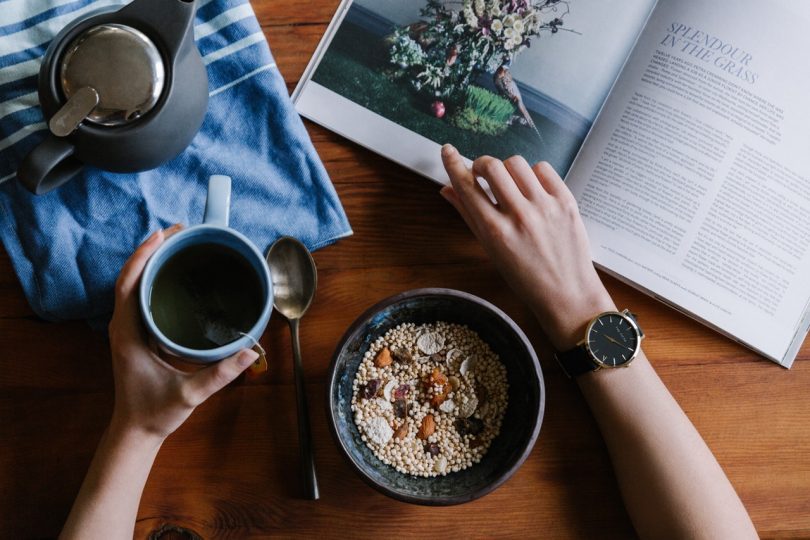Drinking a cup of tea instead of your usual caffeine fix, doling on generous sunscreen before heading outside to enjoy some sunny hours beside the pool, stocking up on high-fiber foods . . . yes, these are all healthy habits. But one medical expert found out through years of study that these seemingly healthy and everyday habits may have unhealthy drawbacks.
Tea, Coffee [or Any Hot Drink for the Matter]
Tea is good for the body as it is loaded with antioxidants. Recent studies also showed that having a cup or two of caffeine in a day [don’t drink it near your bedtime, though] also has several health benefits.
Downside: Coffee and tea contain compounds like tannins and chlorogenic acid that bind with a variety of minerals and vitamins from the food that we eat and the supplements that we take making them less absorbable by our bodies. For one, coffee prevents the body from absorbing iron from the food we take in by up to 80% if we drink a cup within an hour after a meal. Tea, on the other hand, reduces zinc, magnesium and calcium absorption. In addition to that, hot drinks and foods destroy the good bacteria we get from probiotic products.
Solution: One expert advises never to down medicine – vitamin supplements or otherwise – with coffee or tea. Instead, wash them down with orange juice or water. It’s also best if we eat our meals with water instead of with other drinks. And we should never drink or eat any hot beverages or food within an hour after taking in any probiotic supplements or drinking probiotic drinks.
Sunscreen
We’re advised at how important it is to put on sunscreen before stepping into the sun to avoid getting skin cancer.
Downside: However, putting on too much sunscreen or avoiding being under the sun altogether is putting us at risk of vitamin D deficiency, the vitamin being necessary for calcium absorption. Lack of it is bad for our bones.
Solution: Soak in the sun rays of early mornings when they’re not in full blast and don’t still feel too hot or painful on the skin. Another option is to take vitamin D supplements.
Contraceptive Pills
Contraceptive pills are one of the many ways to prevent unwanted pregnancies promoting conscious and responsible family planning.
Downside: There are a number of studies – including one from the World Health Organization – that have expressed concerns over how contraceptive pills lower its taker’s vitamins and minerals levels particularly vitamins C, E, B2, B6 and B12 as well as folate/folic acid, zinc, selenium and magnesium. While experts are still on the search as to how this happens, it is generally believed that it is partly because of fluid retention.
Contraceptive pills use estrogen and progesterone, steroid hormones that affects the kidneys and the balance between the salt and the fluid in the body. The hormones most likely cause fluid and sodium retention which, in turn, upset the blood’s micronutrients concentration.
Additionally, there are also expressed concerns about how contraceptive pills reduce the absorption of folate/folic acid. A lack of this nutriment increases the risk of fetus abnormalities in pregnancies that occur while one is taking oral contraceptive pills or soon after stopping taking it.
As for the headaches women who take contraceptive pills actually experience unwanted pregnancies promoting conscious family planning partly because of fluid retention.
times experience [usually before the monthly period], it could be because of the lowered vitamin B2 levels in the body.
Solution: When you’re on the pill, it is important that you also follow a nutritious meal plan with at least five servings of fruits and vegetables every day. And if you are planning on getting pregnant in the near future, then, it is better if you take a vitamin and mineral supplement, too, specifically one that contains folate/folic acid.
High-Fiber Foods
High-fiber foods are good at cleaning the guts but . . .
Downside: Bran and phytates, compounds found in high-fiber foods such as legumes, nuts, seeds, whole grains and unleavened bread, bind to the minerals in the gut. Because of this, the minerals are not absorbed. The action may reduce about 65% of your non-haem iron absorption [non-haem means it’s not red meat-based but come from veggies, beans, cereals and pulses]. The compounds also bind with zinc, calcium and manganese making them less absorbable.
Solution: If you are on a high-fiber diet, make sure you’re also getting enough calcium from sources like dairy, broccoli, pulses, seeds and nuts. You also need to load up on vitamin C [you can get this from orange juice] as it boosts the body’s ability to absorb non-haem iron absorption.





